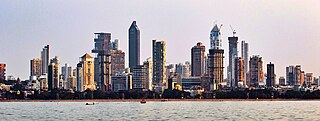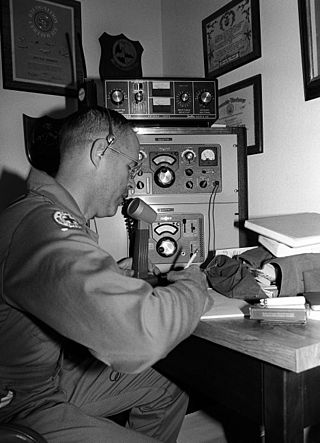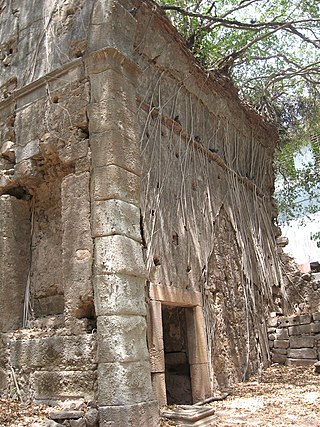Related Research Articles

Mumbai, formerly known as Bombay, is the capital city of the Indian state of Maharashtra. Mumbai is the financial capital and the most populous city proper of India with an estimated population of 12.5 million (1.25 crore). Mumbai is the centre of the Mumbai Metropolitan Region, the sixth-most populous metropolitan area in the world with a population of over 23 million. Mumbai lies on the Konkan coast on the west coast of India and has a deep natural harbour. In 2008, Mumbai was named an alpha world city. Mumbai has the highest number of billionaires out of any city in Asia.

The Greater Mumbai Police is the police department of the city of Mumbai, Maharashtra. It is a city police commissionerate under the Maharashtra Police and has the primary responsibilities of law enforcement in the city of Mumbai and its surrounding areas. The force's motto is Sadrakṣaṇāya Khalanigrahaṇāya.

The North-West Frontier was a region of the British Indian Empire. It remains the western frontier of present-day Pakistan, extending from the Pamir Knot in the north to the Koh-i-Malik Siah in the west, and separating the modern Pakistani frontier regions of North-West Frontier Province, Federally Administered Tribal Areas and Balochistan from neighbouring Afghanistan in the west. The borderline between is officially known as the Durand Line and divides Pashtun inhabitants of these provinces from Pashtuns in eastern Afghanistan.

Auxiliaries are support personnel that assist the military or police but are organised differently from regular forces. Auxiliary may be military volunteers undertaking support functions or performing certain duties such as garrison troops, usually on a part-time basis. Unlike a military reserve force, an auxiliary force does not necessarily have the same degree of training or ranking structure as regular soldiers, and it may or may not be integrated into a fighting force. Some auxiliaries, however, are militias composed of former active duty military personnel and actually have better training and combat experience than their regular counterparts.

Makhdoom Ali Mahimi Shafi'i was a saint and scholar of international repute. He lived during the time of the Tughlaq dynasty and that of Sultan Ahmed Shah of Gujarat, and was married to the Sultan's sister. He is widely acknowledged for his scholarly treatises, liberal views and humanist ideals. Mahimi was born into a family of Arab travelers from Iraq who had settled down on the island of Mahim known as Nawayath, one of the seven islands that later formed the city of Bombay.
Gerald Aungier was the 1st Governor of Bombay. He was made the president of the Surat factory and the governor of Bombay in 1669, which posts he held until his death in 1677. He was responsible for the initial growth of the city. He is said to have famously quoted Bombay to be "the city which by God's assistance is intended to be built".

The provinces of India, earlier presidencies of British India and still earlier, presidency towns, were the administrative divisions of British governance on the Indian subcontinent. Collectively, they have been called British India. In one form or another, they existed between 1612 and 1947, conventionally divided into three historical periods:

The Royal Indian Navy mutiny or revolt, also called the 1946 Naval Uprising, is a failed insurrection of Indian naval ratings, soldiers, police personnel and civilians against the British government in India. From the initial flashpoint in Bombay, the revolt spread and found support throughout British India, from Karachi to Calcutta, and ultimately came to involve over 10,000 sailors in 56 ships and shore establishments. The mutiny failed to turn into a revolution because sailors were asked to surrender after the British authorities had assembled superior forces to suppress the mutiny.
The Bhandari community is a caste that inhabits the western coast of India. Their traditional occupation was "toddy tapping".they were also good naval warriors. They form the largest caste group in the state of Goa, reportedly being over 30% of that state's Hindu population, and play a major role in deciding the future of any political party there. Bhandaris are included in the list of Other Backward Classes (OBCs) in Goa and Maharashtra.

Chakra is a 1981 Hindi movie directed by Rabindra Dharmaraj. The film stars Naseeruddin Shah, Smita Patil and Kulbhushan Kharbanda.

The Bombay Army was the army of the Bombay Presidency, one of the three presidencies of British India.
Indigenous tribals have inhabited Mumbai (Bombay) since the Stone Age. The Kolis and Aagri were the earliest known settlers of the islands. Between the 2nd century BCE and 10th century CE, the islands came under the control of successive indigenous dynasties: the Satavahanas, Abhiras, Vakatakas, Kalachuris, Konkan Mauryas, Chalukyas, Rashtrakutas, Silharas & Cholas.

Bombay, also called Bom Bahia or Bom Baim in Indo-Portuguese creole, Mumbai in the local language; is the financial and commercial capital of India and one of the most populous cities in the world. It's also the cosmopolitan city centre of the Greater Bombay Metropolitan Area, and the cultural base of the Bollywood film industry. At the time of arrival of the Portuguese Armadas, Bombay was an archipelago of seven islands. Between the third century BCE and 1348, the islands came under the control of successive Hindu dynasties. The Delhi Sultanate had been ruling the area along with Chaul, New Bombay (Thana) & Damaon; with the local administration at Bassein (Vasai) since the raids of Malik Kafur in the Konkan region and across the Indian subcontinent. This territory in North Konkan along with the Bombay islands were later taken over by the Sultan of Guzerat from 1391 to 1534, when he had declared the end of the suzerainty to Delhi, after the Timurid invasion of it. Growing apprehensive of the power of the Moghal emperor Humayun, Sultan Bahadur Shah of Gujarat was obliged to sign the Treaty of Bassein on 23 December 1534; according to which, the Seven Islands of Bombay, Fort San Sebastian of Bassein in strategic town of Bassein (Vasai), and its dependencies were offered to the Portuguese East Indies. The places were only later officially surrendered on 25 October 1535, by the Sultan of Guzerat.

Maharashtra Police is the law enforcement agency responsible for the Indian state of Maharashtra. It is headed by Director General of Police, Rashmi Shukla (IPS), and headquartered in Mumbai, Maharashtra.

May Nak was a Bhandari caste admiral in the navy of Chhatrapati Shivaji, and helped to lead the formation of the Maratha Empire. Along with Daria Sarang, another admiral who served Maharaj, Bhandari commanded a naval fleet of 200 ships. Their official titles of Mai Nayak Bhandari and Daria Sarang translate to Water Leader and Sea Captain, respectively. The Maratha Navy was the forerunner of India's present-day Coast Guard. A memorial has been built to Ram Nayak Bhandari at Bhatye Village, close to Ratnagiri town.
A Village Accountant or Karanam, Patwari, Patowary (Assam), Talati, Lekhpal is a government role in rural areas of the Indian subcontinent. Introduced during the early 16th century, it was maintained by the British Raj. The official, as a representative of the state, is responsible for keeping land records, agricultural records and collecting taxes and acting as the revenue police in certain areas where they were given special jurisdiction.

Dalveer Bhandari is an Indian jurist. He is currently one of the judges of the International Court of Justice. He is a former judge of the Supreme Court of India and former chief justice of the Bombay High Court, he was also a judge of the Delhi High Court.

Sailing as a form of transportation and for fishing has a very long history in India, owing to the large coastline and many rivers. Vessels from all parts of the world sailed to India down the ages for trade and many Indian sailors served on these ships. Sailing as a sport in India can be traced back to the first recorded race being sailed on 6 February 1830 in the western city of Bombay. Till the time the British left India in 1947, there were five active sailing clubs located at Bombay, Madras, Bangalore, Barrackpore and Nainital. Today, there are clubs located in Kerala, Pune, Goa, Hyderabad, and Bhopal. The Yachting Association of India is the governing body for sailing, windsurfing and motorboating in India. The Yachting Association of India was formally constituted on 15 May 1960. In 2011, Peter Conway of England was appointed as the national sailing coach. India’s first National Sailing School (NSS) was opened at the Upper Lake in Bhopal in 2006, with support from the Indian Navy and the Yachting Association of India.
The New Year Honours 1913 were appointments by King George V to various orders and honours to reward and highlight good works by members of the British Empire. They were announced on 3 January 1913.
The New Year Honours 1907 were appointments by Edward VII to various orders and honours to reward and highlight good works by members of the British Empire. They were published on 1 January 1907.
References
- ↑ Criminal Justice India Series, Vol. 4 (HB). Allied Publishers. pp. 20–21. ISBN 8177643657 . Retrieved 2 May 2013.
- The Bombay City Police – A Historical Sketch 1672–1916. Oxford University Press. 21 March 2024. pp. 1–19.